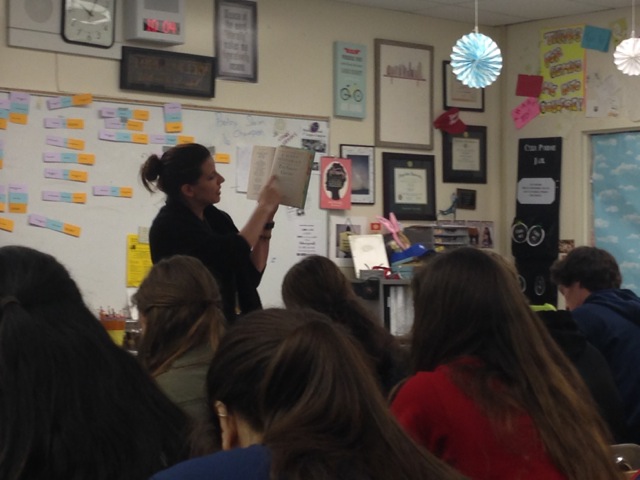Darker themes in literature allow for deeper topics
Ms. Little discussing The Great Gatsby with her junior class. The Great Gatsby is known for being one of the most enjoyable books read in high school, but what about the rest?
March 26, 2015
Many people tend to dislike the literature we read in school due to the recurring dark, depressing themes, but I, for one, like them.
Another factor is that many of the books we read are just old, so some students feel that these books are outdated. Older novels can come across as hard to understand, but you don’t have to be a brainiac to enjoy the story. Older literature allows us to realize our blind spots (assumptions we take for granted) in today’s society that would have previously been scoffed at in older times.
The books we read are like time machines taking us back to different times in history and giving us the chance to experience it. What people don’t understand or appreciate is that these books are classics, but then again, what is a classic?
A classic is a book that has been accepted by many as exemplary and even timeless.
Some books are required to be read by each grade level, because they teach a valuable lesson. For instance, all freshmen read Romeo and Juliet, but why is that?
First of all, Shakespeare is one of the most influential playwrights, and Romeo and Juliet introduces freshmen to middle aged english which will prepare them for higher level reading as they move from one grade to another. It also brings in the theme of tragedy and contains many literary devices that students need to begin familiarizing themselves with.
Moving on to the actual story of the books we read, many literary pieces focus on characterization rather than plot, which tends to disappoint certain readers, including myself; however, the focus on the character makes the pieces more relatable and makes the struggles the character faces transform into the plot, since all people go through struggles thus making books appear more depressing.
My belief is that many students find it hard to grasp the true meaning or moral behind a story and throw it into the ever growing pile of boring school books. We as students don’t have enough experience at times to quite grasp symbolism, and feel annoyed when teachers try to force symbolism upon us since the teacher didn’t actually write the novel.
Symbolism adds depth and meaning to a story, and can often act as a way to connect the theme and story of a novel. The confusing bit is that symbols can mean different things to different people based on prior knowledge one already has stored in their mind.
As for the dark themes, the books we read do cover depressing matters, but is it really that shocking? Life isn’t a walk through a field of daisies, so why create stories where nothing goes wrong? The novels cover important aspects of life that a high school student’s mind should be able to decipher and investigate.
I often find connections with characters in the books I’ve read even if they are old. It shows a connection between the past, present, and future.
Yes, maybe the novels we read are depressing, but they can be interesting. So what if they’re old? It’s still a story with characters just like any other book. Get over it and look past it to actually grasp why we’re reading the novel.











